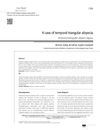 32 citations,
November 2011 in “International Journal of Dermatology”
32 citations,
November 2011 in “International Journal of Dermatology” Diagnose and manage CCCA with thorough history, exams, and labs; treat with anti-inflammatory agents, stress reduction, and stopping harmful hair practices.
 17 citations,
October 2017 in “Journal of Cutaneous Medicine and Surgery”
17 citations,
October 2017 in “Journal of Cutaneous Medicine and Surgery” No treatment has been proven to effectively stop hair loss or regrow hair in Frontal Fibrosing Alopecia, and more research is needed.
[object Object]  11 citations,
May 2021 in “Dermatologic clinics”
11 citations,
May 2021 in “Dermatologic clinics” PRP and cell therapies may help with hair loss, but more research is needed.
 1 citations,
February 2012 in “The American Journal of Cosmetic Surgery”
1 citations,
February 2012 in “The American Journal of Cosmetic Surgery” UBM helps hair regrowth in men and women with hair loss.
 100 citations,
April 2010 in “Expert Opinion on Pharmacotherapy”
100 citations,
April 2010 in “Expert Opinion on Pharmacotherapy” Hair loss in men treated best with early medication or transplant, new treatments researched.
 26 citations,
April 2019 in “Journal of Cosmetic Dermatology”
26 citations,
April 2019 in “Journal of Cosmetic Dermatology” Herbal alternatives like saw palmetto and green tea may offer safe, effective treatment for hormonal hair loss.
 20 citations,
October 2018 in “Aesthetic Plastic Surgery”
20 citations,
October 2018 in “Aesthetic Plastic Surgery” PRP shows promise for improving facial wrinkles, skin elasticity, and hair growth, but more research is needed to standardize its use and understand its effects.
 13 citations,
March 2017 in “Genomics”
13 citations,
March 2017 in “Genomics” Genomic approach finds new possible treatments for hair loss.

Stem cell therapy shows promise for treating hair loss in androgenetic alopecia.
 57 citations,
May 2016 in “Journal of Dermatological Treatment”
57 citations,
May 2016 in “Journal of Dermatological Treatment” PRP therapy may effectively treat hair loss, but more research needed.
 38 citations,
March 2017 in “Expert Opinion on Investigational Drugs”
38 citations,
March 2017 in “Expert Opinion on Investigational Drugs” Bimatoprost is promising for treating some types of hair loss but needs more testing for androgenetic alopecia.
 12 citations,
June 2020 in “Dermatology and therapy”
12 citations,
June 2020 in “Dermatology and therapy” Platelet-Rich Plasma (PRP) can promote new hair growth and increase hair density, but its effectiveness varies depending on the type of hair loss.
 17 citations,
August 2015 in “Expert Opinion on Pharmacotherapy”
17 citations,
August 2015 in “Expert Opinion on Pharmacotherapy” The document concludes that oral finasteride and topical minoxidil are effective for genetic hair loss, while other treatments for different types of hair loss show promise but need more research.
 December 2020 in “TURKDERM”
December 2020 in “TURKDERM” A 3-year-old boy was diagnosed with a rare, non-scarring hair loss condition called temporal triangular alopecia.
 23 citations,
April 2021 in “Journal of Clinical Medicine”
23 citations,
April 2021 in “Journal of Clinical Medicine” Frontal Fibrosing Alopecia's cause is unclear, affects mainly postmenopausal women, and current treatments focus on stopping hair loss rather than regrowth.
 October 2021 in “Aesthetic Plastic Surgery”
October 2021 in “Aesthetic Plastic Surgery” New techniques in hair restoration surgery can lead to better hair alignment.
January 2021 in “Springer eBooks” PRP might help with hair growth, but its effectiveness in hair transplants is unclear.
11 citations,
March 2021 in “Cleveland Clinic Journal of Medicine” Treating hair loss in both men and women is effective and improves quality of life.
 October 2024 in “Journal of Cutaneous and Aesthetic Surgery”
October 2024 in “Journal of Cutaneous and Aesthetic Surgery” Including the parietal eminence in hair transplants improves scalp appearance and balance.
 May 2023 in “Frontiers in Cell and Developmental Biology”
May 2023 in “Frontiers in Cell and Developmental Biology” The document concludes that using stem cells to regenerate hair follicles could be a promising treatment for hair loss, but there are still challenges to overcome before it can be used clinically.
 January 2016 in “Jaypee Brothers Medical Publishers (P) Ltd. eBooks”
January 2016 in “Jaypee Brothers Medical Publishers (P) Ltd. eBooks” Hair transplant surgery can have complications.
 47 citations,
October 2014 in “Expert Opinion on Emerging Drugs”
47 citations,
October 2014 in “Expert Opinion on Emerging Drugs” New alopecia treatments aim for better results and fewer side effects.
 46 citations,
April 2014 in “PLOS ONE”
46 citations,
April 2014 in “PLOS ONE” Gray hair may be caused by lower antioxidant activity in hair cells.
[object Object]  32 citations,
April 2017 in “Scientific Reports”
32 citations,
April 2017 in “Scientific Reports” Platelet-rich plasma can help grow more mouse hair follicles, but it doesn't work for human hair follicles yet.

Different genes cause Female Pattern Hair Loss compared to male hair loss, and treatments vary, but more research is needed to understand it fully.
January 2022 in “Aesthetic surgery journal” Extracellular vesicles may effectively treat hair loss with minimal side effects.
 29 citations,
January 2021 in “Journal of Investigative Dermatology”
29 citations,
January 2021 in “Journal of Investigative Dermatology” Fat under the skin releases HGF which helps hair grow and gain color.
 3 citations,
May 2018 in “Journal of nutritional health & food science”
3 citations,
May 2018 in “Journal of nutritional health & food science” Nutritional supplements can help manage hair loss and promote hair growth by strengthening hair roots and countering harmful effects of pollution, smoking, and deficiencies in vitamins and minerals.
 May 2018 in “Journal of dermatology and dermatitis”
May 2018 in “Journal of dermatology and dermatitis” PRP is a promising treatment for autoimmune hair loss but its exact workings are not fully understood.
 8 citations,
October 2022 in “Regenerative Therapy”
8 citations,
October 2022 in “Regenerative Therapy” New regenerative treatments for hair loss show promise but need more research for confirmation.



























